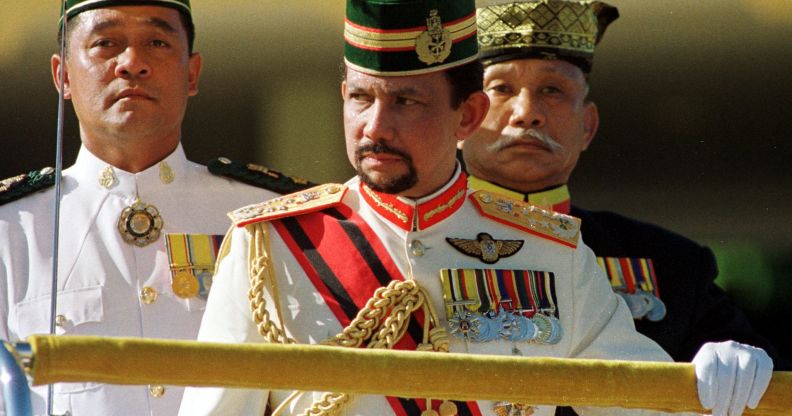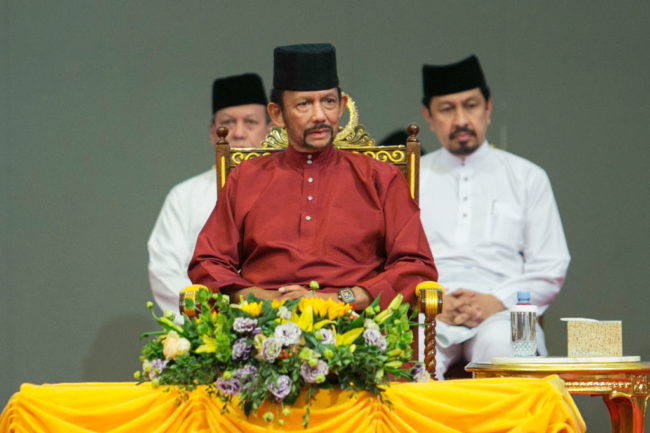Brunei will not enforce death penalty for gay sex following backlash

Brunei’s sultan Hassanal Bolkiah. (ROSLAN RAHMAN/AFP/Getty)
The Sultan of Brunei, Hassanal Bolkiah has said that the country will not enforce the death penalty for gay sex, following a global campaign against the small state.
In a rare statement that was also provided in English, the Sultan confirmed that the death penalty would not be imposed on the country’s Syariah Penal Code Order (SPCO).
Under the penal code, which had been imposed by the Sultan at the start of April to international outcry, sodomy, adultery and rape are punished with death.
Reuters reports that in a speech ahead of Ramadan, the Sultan of Brunei said: “I am aware that there are many questions and misperceptions with regard to the implementation of the SPCO. However, we believe that once these have been cleared, the merit of the law will be evident.
“As evident for more than two decades, we have practised a de facto moratorium on the execution of death penalty for cases under the common law. This will also be applied to cases under the SPCO which provides a wider scope for remission.”
The extension of the moratorium comes after an outcry by campaigners, celebrities, politicians and businesses.
The Sultan also suggested that Brunei will finally ratify the United Nations Convention against Torture.
Homosexuality remains illegal in Brunei for men and women.
Commonwealth Secretary-General Baroness Scotland, who had led criticism of the country’s law, welcomed the news.
She said, “I have been in contact with the government of Brunei Darussalam both before and after April 3, strongly urging it to reconsider the implementation of these harsh punishments.
“I am delighted the death penalty has been removed and that the de facto moratorium which has been in place for more than two decades, will also cover the SPCO.
“I encourage Brunei to also revoke the other harsh punishments under the SPCO, including amputation and flogging.”
Brunei told European union that the death penalty would be rare
Last month, Brunei issued a letter to the European Union defending its new policy imposing the death penalty for gay sex, claiming executions will be rare.
The country issued the formal letter ahead of an EU debate on whether the country’s harsh new penal code violates human rights standards.
Homosexuality was already illegal in the country, but the Sharia penal code introduces the death penalty for gay sex and adultery, while lesbian sex is punished with whipping.
However, in the April 15 letter, Brunei’s Mission to the European Union claims that “there appears to be a misconception” about the penal code.
The letter claims: “The criminalisation of adultery and sodomy is to safeguard the sanctity of family lineage and marriage of individual Muslims, particularly women.
“The offences, therefore will not apply to non-Muslims unless the act of adultery or sodomy is committed with a Muslim.”
It adds that the death penalty has an “extremely high evidentiary threshold (…) to the extent that convictions may solely rest on confessions of the offender.”

The Sultan of Brunei, who introduced death by stoning for gay people earlier this month (AFP/Getty)
It adds that the punishment of whipping will be conducted with “moderate force.”
The letter goes on to claim that the penal code’s provisions are “not man-made laws but are ordained by Allah,” adding that they are “not to be misunderstood as any kind of radicalisation.”
The country claims it “reaffirms its commitment to its international obligations in promoting and protecting human rights as enshrined in the Charter of the United Nations and the Universal Declaration of Human Rights,” adding: “As a responsible member of the international community, [Brunei] will continue to uphold its obligations and adhere to international covenants on human rights.”
Sultan of Brunei stripped of honorary titles over ‘death to gays’ law
In the UK, several honours previously awarded to the Sultan of Brunei Hassanal Bolkiah have been placed under review.
On Wednesday (April 17), the University of Aberdeen announced it had revoked an honorary degree given to the sultan in an “unprecedented” decision.
The Royal College of General Practitioners (RCGP) also unanimously agreed to revoke an honour given to the sultan, and said it would also rename the Brunei Auditorium at its London headquarters.
King’s College London and the University of Oxford have both also said they will review honorary degrees given to the Commonwealth country’s leader.
“We will reconsider this decision through our established process in light of the information now available, as other British Universities are doing,” reads the statement from the University of Oxford.
“At no point has the University declined to reconsider this decision.”
King’s College London said: “King’s is very proud of our diverse community. We take very seriously the concerns raised by our community regarding the honorary degree held by the Sultan of Brunei which was awarded in 2011.
“President & Principal Ed Byrne shares these concerns, and given recent developments has asked the university’s Fellowships and Honorary Degrees Committee to urgently review the award.”

